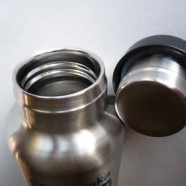Stainless Steel Bottles
Stainless Steel Water Bottles
With so many different kinds of reusable water bottles out there, it’s hard to know which material is the safest for you and your family to keep your much-needed water in. Especially lately, the market has been flooded with metal water bottles, only some of which are genuinely stainless steel (some are aluminum with liners). Among stainless bottles, there are also different grades of stainless steel, depending on the elements that are present and what percentages of the steel alloy they make up.
The grades of stainless steel that are considered suitable for use with foods and beverages are numbered like this:
18/8 or 301- which stands for 18% chromium and 8% nickel.
and
18/10 or 304- 18% chromium and 10% nickel.
In these alloys, the chromium and nickel are added to make the steel resistant to rust and corrosion, as well as durable and non-magnetic (if stainless steel bottles were magnetic, though, it might help finding lost keys!). Metal water bottles are also relatively easy to have customized for a company or charitable organization, so if you happen to get one for some reason or another and want to know if it’s a safe stainless steel water bottle, check for those numbers, and you can be pretty sure that you’ve got a bottle that won’t absorb or transfer flavors or leach toxins into your water.
Keep in mind, though, that nothing is absolutely perfect.
Some of these freebies are marked as a safe stainless steel grade, but the company does not do any follow-up testing to ensure that the bottles are indeed made from safe, non-leaching material. This can be a big problem: grades of stainless steel that are not approved for food may contain lead, or too much nickel, which is definitely not a safe way to store food and beverages. Paints that contain harmful substances can also flake off of cheaply made stainless steel water bottles.
‘So are stainless water bottles safe?’ you ask. The answer is that yes, they are, if good quality food grade steel and non-leaching plastics are used in the construction of both bottles and caps. With all of the freebie bottles and imitators on the market today, it is hard to tell the genuine article. Some also tend to use a thinner gauge of stainless steel, making them less durable and dent-resistant.


